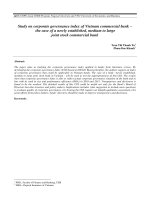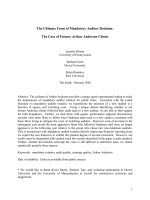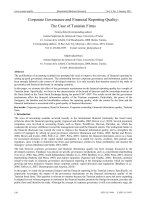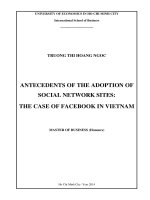Activities performed by volunteers the case of mekedonia humanitarian association
Bạn đang xem bản rút gọn của tài liệu. Xem và tải ngay bản đầy đủ của tài liệu tại đây (728.8 KB, 88 trang )
Activities Performed by Volunteers: The Case of Mekedonia Humanitarian
Association.
Ashenafi Kassaye Dalecho
Advisor: Ashenafi Hagos (PhD)
A Thesis Submitted to the School of Graduate Studies in Partial Fulfillments of the
Requirements for the Degree of Masters of Social Work
Addis Ababa University
Addis Ababa, Ethiopia
June, 2017
1
Approval Sheet
The undersigned certify that he has read and hereby recommend to the Addis Ababa University School of
Social Work to accept the thesis submitted by Ashenafi Kassaye and entitled: Activities Performed by
Volunteers to Promote Care and Support for their Clients: The Case of Mekedonia Humanitarian Associations
and prepared for the partial fulfillment of the Degree of Masters of Social Work.
Advisor: Ashenafi Hagos (PhD)
Signature፡______________________
Date፡___________________________
2
Addis Ababa University
School of Graduate Studies
This is to certify that the thesis prepared by Ashenafi Kassaye, entitled: Activities Performed by Volunteers:
The Case of Mekedonia Humanitarian Association and submitted for the partial fulfillment of the requirements
for the degree of Masters of Social Work compiles with the regulations of the University and meets the
accepted standards with respect to originality and quality.
Signed by the examining Committee:
Examiner ______________________ Signature ___________ Date ______________
Examiner ______________________ Signature ___________ Date ______________
Advisor ______________________ Signature ___________ Date ______________
3
Acknowledgement
Praise is to Almighty God, the cherisher, sustainer and governor of the worlds. He has
reached me to this stage of submitting this final essay. Acknowledges are for those who directly
or indirectly contributed to bring this work to a successful end. First of all, I would like to thank
my advisor, Ashenafi Hagos (PhD) for his effort in advising me from the inception to the
development of the proposal and until the final processes of this study. I am always thankful for
his friendly orientation of advisement and endless motivations to read and evaluate my paper.
I would also like to acknowledge volunteers and staffs of Mekedonia Humanitarian association
for their kind support.
4
Acronyms
EBS
Ethiopian Broadcasting Corporation
GIZ
Gesellshaft fur Internationale Zusammenarbeit
HIV/AIDS Human Immune Virus/Acquired Immune Deficiency Syndrome
MHA
Mekedonia Humanitarian Association
SMS
Short Message Service
TB Tuberculosis
5
Abstract
Volunteers are defined as those who help others with no expectation of monetary rewards
and volunteerism as a type of activity that is intended to improve the wellbeing of others.
However, Activities Performed by Volunteers is not well studied dimension in the Ethiopian
context in general and in the study area in particular. Consequently, the major purpose of this
study was to investigate activities performed by volunteers of Mekedonia Humanitarian
Association. The study used qualitative method with case study approach. Purposive sampling
technique was used to select samples. Data were gathered through interview, observation and
document review. The collected data were organized and analyzed through qualitative research
approach. Findings of this study revealed that, there are many motivational factors that make
individuals to volunteer in social services. Among these, the main are to get mental satisfaction,
to get God‟s blessing, to help succeed the organization its objectives, serve the community and
getting opportunity to develop skills. The study found out that volunteers perform various
activities ranging from simple tasks to more professional duties. Promoting the organization
mission and values is among the activities volunteers perform. Concerning challenges of
volunteering, lack of awareness about giving volunteer services, inadequate office facility and
time constraints were found to be major challenges. This study forwarded implications for
service, policy, research and education. As part of social work implication, what volunteers do in
the association is related with social work roles that can be linked with “Reflexive therapeutic”
approach which focuses on promoting and facilitating personal growth.
Key Words: Voluntary activities, Volunteering, Volunteer, Volunteerism
6
Table of Contents
Contents
Page
Acknowledgement ......................................................................................................................... I
Acronym ....................................................................................................................................... II
Abstract ........................................................................................................................................III
Chapter One: Introduction
1.1 Introduction ..............................................................................................................................1
1.2. Statement of the Problem ........................................................................................................2
1.3. Objectives of the Study .............................................................................................................6
1.3.1 General Objectives ..............................................................................................................6
1.3.2 Specific Objectives .............................................................................................................6
1.4. Research Questions ...................................................................................................................6
1.5. Significance of the Study ........................................................................................................7
1.6. Scope of the study .....................................................................................................................7
1.7. Definitions of Terms ...............................................................................................................7
Chapter Two: Literature Review
2.1. Introduction ...............................................................................................................................9
2.2. Overview of Volunteerism ........................................................................................................9
2.3. The Role of Volunteer Work ..................................................................................................10
2.4. Benefits of Volunteering .........................................................................................................13
2.4.1. Health Benefit ..................................................................................................................13
2.4.2. Building Work Experience ..............................................................................................14
2.5. Volunteering and community development ............................................................................15
2.6. Motivational Factors of volunteering......................................................................................17
2.7. Volunteering as Prosocial Behavior........................................................................................18
2.8. Impacts of Volunteerism .........................................................................................................19
2.8.1. Social Impact ...................................................................................................................19
2.8.2. Impacts on the Volunteer .................................................................................................21
2.9. Hospice Volunteerism .............................................................................................................21
2.10. Functional motivation theory ...............................................................................................23
7
2.11. Intrinsic and Extrinsic Motivational Orientations.................................................................24
2.12. Historical Context of Volunteering in Africa .......................................................................25
Chapter Three: Research Methodology
3.1. Philosophical Stance ...............................................................................................................28
3.2. Research Design......................................................................................................................28
3.3. Study Area ..............................................................................................................................29
3.4. Sampling Techniques ..............................................................................................................31
3.5. Sample Size.............................................................................................................................31
3.6. Method of Data Collection......................................................................................................31
3.6.1. Interview ........................................................................................................................31
3.6.2. Key Informant Interview .................................................................................................32
3.6.3. Observation .......................................................................................................................33
3.6.4. Document Review ............................................................................................................33
3.7. Method of Data Analysis ........................................................................................................34
3.8. Enhancing Rigor .....................................................................................................................34
3.9. Ethical Consideration ..............................................................................................................35
3.10. Limitations of the Study........................................................................................................36
Chapter Four: Data Presentation
4.1. Background Information of Participants .................................................................................37
4.2. Reasons to Volunteer ..............................................................................................................38
4.3. Motivation to Volunteers in Mekedonia .................................................................................42
4.4. Activities Performed by Volunteers........................................................................................48
4.5. Challenges of Volunteering ....................................................................................................51
Chapter Five: Discussion .............................................................................................................55
Chapter Six: Conclusions and Social Work Implications
6.1. Conclusion ..........................................................................................................................60
6.2. Social Work Implications ...................................................................................................60
Reference .......................................................................................................................................64
Appendix I- Informed Consent Form ............................................................................................73
Appendix II- Observation Checklist ..............................................................................................74
8
Appendix III- In-Depth Interview Guide for Volunteers .............................................................74
Appendix IV- In-depth Interview Guide for key informant ..........................................................75
Appendix V: Letter of Declaration ................................................................................................76
9
Chapter One: Introduction
1.1. Introduction
Volunteer work is understood in its traditional meaning as unpaid activity that is oriented
to help others. It has existed throughout the history of humanity. It has ranged from casual or
regular assistance to family members in need and community residents, to more collective and
organized efforts to better the quality of life of the community. Volunteer work refers to all
customs of voluntary activity, whether formal or informal, full-time or part-time, at home or
abroad. It is undertaken of a person‟s own free will, choice and motivation, and is without
concern for financial gain. It benefits the individual volunteer, communities and society as a
whole. It is also a vehicle for individuals and associations to address human, social or
environmental needs and concerns (Fiona, Joyce and Lawrence, 2015).
Volunteer activities take many forms; involvement in voluntary associations, activism
focusing on social change or donations of money, supplies or blood donations (Wilson, 2000).
Other expressions of volunteering are mutual help in the health and social welfare field,
generosity to others within voluntary or community organizations. Volunteers in hospitals,
schools, religious organizations, sport clubs and other community organizations all contribute to
the breadth and effectiveness of services (Hiatt & Jones, 1998). Thus, volunteers, apart from
their contribution to the social welfare, may be considered an essential human resource for many
organizations.
What motivates people to volunteer has been the subject of many articles and books.
Each identifies a variety of motives that lead people to volunteer, and emphasizes their
importance. Why people volunteer is intimately and directly related to the kind of volunteer
10
activity they undertake, its conditions and duration, their commitment to it, and the success or
failure of the volunteer placement (Lorraine, 1994). According to researches the main
motivational factors are personal satisfaction, helping others, to acquire knowledge and to spend
time (Tafetu Shiferaw, 2007).
Volunteers, in numerous ways, are contributing to the delivery of health and social care,
and helping people in their communities to live healthier lives. Volunteers play an important role
in improving people‟s experience of care, building stronger relationships between services and
communities, supporting integrated care, improving public health and reducing health
inequalities. The support that volunteers provide can be of particular value to those who rely
most heavily on services, such as people with multiple long-term conditions or mental health
problems (Chris, Claire, Lisa, David, 2013).
The study is conducted in Mekedonia Humanitarian Association which is founded on 07
January 2010. Mekedonia Humanitarian Association is an indigenous non-governmental,
not-profit and independent organization serving old and mentally ill people. The association is
contributing in the planning and designing of service delivery through powerful advocacy to
ensure services meet the needs of specific groups or individuals.
1.2. Statement of the Problem
Various researches are conducted on different dimensions of volunteerism. For instance,
Tadesse Amera (2007) conducted a study on the role of voluntary youth in HIV/AIDS
prevention, care and support and he discovered that majority of the volunteers in HIV/AIDS
prevention, care and support are active in playing their role. Most of them are also willing to
continue their volunteerism and advise their friends; and also they envisioned volunteerism for
11
their future career. However, the study cannot be representative of the national voluntary youth
role and it may not be used to generalize the national status because it focused volunteers in
Addis Ababa.
Wondwossen T/Selassie (2006) also studied community volunteers and in his thesis he
forwarded that volunteer home care givers perceive that home based care is a continuum of care
that help People living with HIV/AIDS by providing basic care. Yet the findings in the study do
not claim generalizability and data from health professionals a not included in study.
Suleyman Shikur (2011) examined compassion stress among volunteer care givers in
Addis Ababa. His findings show that volunteer caregivers to persons with HIV/AIDS report
experiencing problems with compassion stress as a result of their care responsibilities and the
extent to which a caregiver experience compassion stress depends up on their personal protective
or precipitating characteristics. However the population of the study subjects is mostly females
and this would have some effect on the generalization of the analysis regarding gender
dimension.
Abebanesh Asnake (2015) conducted a study on volunteers‟ contribution to community
based development and came up with the finding that volunteers have significant roles in
community development such as achieving organizational goals filling the resource gap by
contributing through their knowledge and skill, finance and idea. The study didn‟t adequately
present comprehensive data on Volunteering activity in the studied organization.
A number of researches paid attention on motivational factors of volunteering. To
mention some, Abebanesh Asnake (2015) and Tsige Yadessa (2015) conducted a study on
motivational factors and found out the major motives among participants to be helping
12
organizations and communities to enhance their capacities and potentials to ensure common
wellbeing.
Tafetu Shiferaw (2007) researched factors influencing volunteers‟ helping behavior. In
the study the investigator articulated that volunteers have different reasons for their being a
volunteer. To support the work of a Red Cross, contribution to the society, personal satisfaction,
to help others, to learn from others, to spend spare time are some of the reasons that volunteers
provide for their engagement in volunteering.
Robert, Kimberly and Nathan (2007) articulate benefits of volunteering and come up with
the finding that volunteering leads to better health and that older volunteers are the most likely to
receive physical and mental health benefits from their volunteer activities. Moreover, Volunteer
activities can strengthen the social ties that protect individuals from isolation during difficult
times, while the experience of helping others leads to a sense of greater self-worth and trust.
The value of volunteering is a well-researched area of volunteerism. Chris, Claire, Lisa
and David (2013) assessed volunteering in health setting and found volunteers play an important
role in improving people‟s experience of care, building stronger relationships between services
and communities, supporting integrated care, improving public health and reducing health
inequalities. Furthermore, Caroline and Stephen (2012) studied the effect of motivational
practices on volunteer motivation to volunteer and postulated that job expectations and receiving
feedback on their performance is important and good motivator for to volunteer.
Lorraine (1994) conducted a study and contributed an academic insight on volunteerism.
The study reveals that people who come forward to volunteer primarily enhance their efforts to
find paid employment can provide enormous help to the voluntary sector, to their communities,
13
and to themselves. They bring an array of skills, talents, and experience, and can benefit from
volunteering even as they are helping others. This particular study is 22 years old and doesn‟t
claim the fact of volunteering and work experience in recent times.
Wu (2011) investigated social impacts of volunteerism. The findings of the study
indicated volunteering helps build a more cohesive, safer, stronger community, increase the
social network between communities and neighborhood, volunteering promotes people to be
more active in civic engagement and concerned of citizenship.
Jan, George and Aine (2014) explored the role of hospice volunteer in community
settings and their finding claim volunteers can be involved in all aspects of hospice life including
house-keeping activities, assisting with personal care, shopping, transportation and direct patient
care. Volunteer involvement is an increasingly important aspect of community life in general and
in palliative and end of life care in particular. There is evidence of benefits of volunteering to
care providers, to service users and careers.
The above mentioned literatures show volunteerism in different dimensions. But there are
still uncovered areas of volunteerism such as the relationship between volunteerism and social
work, the history of volunteerism in Ethiopia, the extent of social recognition of volunteering and
the ranges of volunteer activities that volunteers perform in humanitarian association. Moreover,
the literatures exhibit different shortcomings. Very few of them are out dated for they cannot
show the current issue in volunteerism. In addition there exist such limitations in representing the
wide reality of the general population using very small sample size. Thus, there exists an evident
knowledge gap that ought to be filled through research undertakings. So, by investigating this
14
unstudied research topic, this study endeavored to accomplish that task. Hence, the major
purpose of this study is geared towards investigating activities performed by volunteers.
1.3. Objective of the Study
1.3.1. General Objective
To describe activities performed by volunteers in Mekedonia Humanitarian Association.
1.3.2. Specific Objectives of the Study
To describe reasons to engage in voluntary services at Mekedonia Humanitarian
Association.
To examine the motivations that drive individuals to participate in voluntary services at
Mekedonia Humanitarian Association.
To identify activities that volunteers perform in humanitarian services given to the clients
of Mekedonia Humanitarian Association.
To identify challenges of volunteering at Mekedonia Humanitarian Association.
1.4. Research Questions
1. What are the reasons for volunteers to engage in voluntary services in Mekedonia
Humanitarian Association?
2. What are the factors that motivate individuals to participate in voluntary services at
Mekedonia Humanitarian Association?
3. What activities do volunteers perform in Mekedonia Humanitarian Association?
4. What challenges do volunteers face while volunteering in Mekedonia Humanitarian
Association?
15
1.5. Significance of the Study
The study generates a comprehensive empirical data on voluntary activities. This particular
study will contribute something to the existing knowledge base either by adding new evidences
or strengthening the existing ones. Moreover, the information obtained from this research will be
used as a good insight to volunteers, social work practitioners, health professionals, policy
makers, researchers, other GOs and NGOs aspiring to support voluntary services. Besides, it
would produce preliminary data and evidence to those who want to conduct further research in
the area. It will have an important implication for service, policy education and research. This
can add weight to the perception of volunteerism.
1.6. Scope of the study
The main purpose of this study is geared towards investigating activities performed by
volunteers and, the driving factors behind Volunteers‟ motivation in the practice of volunteerism.
Volunteers who are giving service in Mekedonia Humanitarian Association with particular
emphasis to Kotebe shelters are the target of this study.
1.7. Definition of Terms
Volunteerism: a set of long-term, planned, pro-social behaviors, within an organizational
setting, undertaken for no financial gain, without compulsion, where time and effort are given for
the betterment of the community in general (Finkelstien, 2009; Penner 2002, p. 448).
Volunteer refers to person who works freely to support the service delivery of the organization
and a diverse group of people (Dekker & Halman, 2003).
16
Volunteering implies any activity in which one invests one‟s own time freely for the benefit of
others. Generally, it is unpaid, non-obligatory, and takes place in an organized context (Wilson,
2000, p. 215).
Voluntary activities refers to all types of voluntary activity, whether formal, non-formal or
informal which are undertaken of a person‟s own free will, choice and motivation, and is without
concern for financial gain (European Council, 2010).
17
Chapter Two: Literature Review
2.1. Introduction
The literature review assesses and synthesizes various researchers‟ findings related to
volunteerism. It contributes in exploring what have been done so far in the area of volunteerism.
Some of the topics include the role of volunteer work, benefits of volunteering, motivational
factors of volunteering, volunteerism and prosocial behavior and impacts of volunteering.
2.2. Overview of Volunteerism
Volunteers are defined as those who help others with no expectation of monetary rewards
and volunteerism as a type of activity that is intended to improve the wellbeing of others
(Mowen & Sujan, 2005). However, more comprehensive definitions of volunteerism describe the
activity as voluntary, ongoing, planned, helping behavior that increases the well-being of
strangers, offers no monetary compensation, and typically occurs within an organizational
context (Penner, 2002).
Volunteers provide their time and efforts for a wide variety of reasons. One of the ways
of understanding volunteer motivations has been based on theories of altruism and selflessness.
According to this theory the primary motivation is that volunteers want to help others. However,
other motives should not be excluded in understanding volunteers. Contemporary notions of
volunteering often involve more project oriented and specific expectations in terms of form,
time, and content of volunteer involvement (Rehberg, 2005).
Studies on social services have found different motivations to volunteer such as: altruism,
social contact, personal interests, and emotional needs (Yeung, 2004). Focusing on volunteering
18
from a leisure activity perspective, some literature suggests that “co-production motives” may be
present. Parker (1997) defined leisure volunteering as giving ones time and energy not to help
others altruistically, help oneself in a market situation, or help a cause in which one believes; but
primarily to have a leisure experience.
Volunteers are part of the nonprofit sector, they enhance the delivery of services and
increase the reach and effectiveness of the organizations they serve (Clary & Snyder, 1999;
Independent Sector, 1999). Most of the nonprofit organizations depend on volunteers to provide
services. These services, if not performed by a volunteer, would either not get done or would
need to be done by paid staff, consuming both personnel and financial resources (Musick &
Wilson, 2007).
Volunteering describes any voluntary activity, which occurs within the framework of a
formal organization or association. On the other hand, informal volunteering captures any
voluntary activity that takes place outside formalized structures such as organizations, but also
outside one‟s own household. Formal volunteer work, again, typically contributes to a collective
good that makes society better, usually through an organization. Thus, formal volunteering
generally implies some kind of benevolent engagement for the larger society (Manatschal &
Freitag, 2014).
2.3. The Role of Volunteer Work
Volunteering is relevant to all spheres of life and volunteers are making a positive impact
on economic, social, cultural and environmental issues. Volunteering can empower people and
communities to full fill their potential and contribute to social change. It can also engender a
greater sense of ownership of „bettering‟ their community. Local people hold the insight and
19
knowledge of local issues which is useful when planning programs of work with community
development professionals. Constructive engagement can lead to positive developments in terms
of health, job creation, innovation and crime prevention (Davis, 2007).
There are four key stakeholder groups that volunteering can make a difference to, these
are the volunteers, organizations, beneficiaries and the wider community. Volunteers themselves
can develop skills or qualities, such as self-confidence as a result of volunteering. A report which
looked at the impact of volunteering for those involved in the community services of the Belfast
City Council found that people who were involved as volunteers increased their range of
friendships, participation in local activities and social gatherings (Volunteer Impact Assessment
Report, 2010:3).
There is a growing body of evidence showing volunteering as a useful way of
maintaining social networks and benefiting the health of older people. As the 50 and over age
group are an increasing proportion of the population it is important to find creative and
meaningful ways of utilizing their skill as well as maintaining their civic engagement
(Volunteering and Health: University of Wales, 2008). There is also evidence that by involving
volunteers, organizations are better able to full fill their aims and develop a more diverse
workforce.
Volunteering often involves people in community work who would not necessarily have
been involved in it in any other capacity i.e. through employment, as a user etc. Volunteers can
bring added value to organizations by offering flexibility in terms of their commitment i.e. giving
time outside of core business hours. It can also connect people who would be unlikely to have
met in any other walk of life and translates into a greater range of skills, and perspective that can
20
be drawn upon (Volunteers and the Wider Organization, Belfast, Volunteer Development
Agency, 2001).
The beneficiaries are the people who benefit from the outcomes of the work which
volunteers have contributed to. A supporting scheme is a good example of the positive change
that volunteers can bring to those in need. In a recent evaluation of a supporting scheme for older
people at risk of social exclusion, clients found that the activities they took part in through the
one to one supporting, offered a vital link to the community, reinforced their ability to cope with
day to day life and had been instrumental in helping them to develop skills, build confidence,
self-esteem and make new friends (Volunteer Impact Assessment Report, 2011).
2.4. Benefits of Volunteering
2.4.1. Health Benefit
Volunteering is one of these health-promoting activities. The link between volunteering
and health is real and tangible. Volunteers and those who work with them have always known
this. The link has now been established in scientific research. It has been and is being
documented and explored in studies. It is demonstrated daily in the life and work of volunteers.
Volunteering can generate a heightened sense of self-esteem, self-worth and confidence, reduce
heart rate and blood pressure, increase endorphin production, resulting in greater feelings of
well-being and calm, boost immune system and nervous system functioning, reduce life‟s
stresses, and overcome social isolation. (Lorraine, 1994)
Researches demonstrate a positive relationship between volunteering and health,
particularly among middle- and older-aged adults. Indeed, a growing body of evidence now
suggests that volunteering in mid- to later- life is not only associated with improved
21
psychological and physical health outcomes but is also associated with a decreased risk of
mortality. As a result of these health benefits, some researchers have begun to consider
volunteering to be an important part of the positive psychology of ageing. (Lindsey, Femida,
Sara, Marlene, 2015).
Gottlieb and Gillespie (2008), for instance, have suggested that “by volunteering, older
adults contribute in meaningful ways to both society and to their own health and quality of life”
(p. 404), and other scholars have gone so far as to suggest that physicians should begin
prescribing volunteering in order to promote healthy ageing in older adults (Hirschfelder and
Reilly 2007)
A number of studies have begun to explore potential mechanisms linking volunteering to
better health outcomes, and have explained the relationship in terms of the presence (or, absence)
of various psychosocial factors. For instance, the well-being benefits derived from volunteering
are likely to occur as a result of reduced stress and „„augmented psychological resources‟‟
(Wilson 2012, p. 23). Indeed, volunteering is associated with an increased ability to cope with
stress and stress-related events. Moreover, volunteering may contribute to better health outcomes
by integrating individuals into a social environment whereby they have access to more (or even
better) forms of social support (Musick & Wilson 2003).
One study found that volunteering among older adults (age 60 and over) provided
benefits to both physical and mental health, while similar correlations were not found for
mid-life adults who volunteer. The analysis also found that while depression is a barrier to
volunteer participation in mid-life adults, it serves as a catalyst for volunteering among older
22
adults, who may seek to compensate for role losses and attenuated social relations that occur
with aging. (Li and Ferraro, 2006)
Another study found that, in general, volunteers report greater life satisfaction and better
physical health than do non-volunteers, and their life satisfaction and physical health improves at
a greater rate as a result of volunteering. The researchers found statistically significant, positive
relationships between volunteering and lower levels of depression (Harlow & Cantor, 1996).
2.4.2. Building Work Experience
As we come in touch with all kinds of people from different walks of life, we observe in
our day Looking for a job today can be a brutal experience. Individuals face a struggle that can
crush self-esteem and erode self-confidence. Young people, regardless of their academic
qualifications, often face a long drawn out search for a job that will allow them to use and
develop their newly acquired skills and knowledge.
Volunteer work can provide real job experience, good, solid training, and opportunities
for workers to innovate and experiment in ways that often aren‟t allowable in the regular job
market. The transferable skills that individuals bring to their volunteer work can often be applied
to a different work-context in the voluntary sector, in such a way that the agency, its clients, and
the volunteer can all benefit. Volunteer work provides an opportunity for people to test their
interests, to experiment, to discover whether or not they are really suited for or called to a
particular field of work before they commit years of study and significant expenditures to
making that kind of change. A bookkeeper can volunteer on a distress line to see if he or she has
the aptitude and attitudes necessary to become a counselor or social worker. A nurse can
23
volunteer at a daycare center to test his or her interest in early childhood education, and so on
(Lorraine, 1994).
Volunteering also has much to offer those who take early retirement, whether chosen or
imposed. Some may not need the salary or wages of paid employment, but would still like to
keep working for a time. These individuals can provide vast expertise and skill to voluntary
sector agencies through their own efforts, and may be available to act as mentors for others in the
organization (Lorraine, 1994).
2.5. Volunteering and Community Development
Volunteering is relevant to all spheres of life and volunteers are making a positive impact
on economic, social, cultural and environmental issues. Volunteering can empower people and
communities to fulfill their potential and contribute to social change. It can also engender a
greater sense of ownership of „bettering‟ their community. Local people hold the insight and
knowledge of local issues which is useful when planning programs of work with community
development professionals. Constructive engagement can lead to positive developments in terms
of health, job creation, innovation and crime prevention (Davis, 2007)
Volunteer activity provides a network of social relationships that connect people to each
other and their communities. It is this connection that is vital to building democratic, healthy and
self-sustaining communities. Arguably some of the most significant and valuable impacts that
come from volunteering are in relation to building skills, relationships, bonds and having
positive outcomes. These are some of the key aims which community development workers will
seek to build: Social Capital; that is building co-operative relationships, building connections;
24
Human Capital; that is building knowledge, skills and confidence; Physical Capital that is
delivering good and services, and Cultural Capital; that is having a sense of one‟s own identity
and understanding of others, sense of belonging to a group (Institute for Volunteering Research,
2010).
Implementing development plan of action requires many resources, including the time
and effort of Volunteers. The more Volunteers involved, the easier it becomes to get the
community‟s support and completed the development plans. Many communities have no paid
staff for the purpose of development and therefore everyone involved is a Volunteer. Having
Volunteers strengthen ownership in the task leads to more community wide acceptance,
understanding, and credibility of the development plan (Wood & Freeman, 1987).
Volunteering contributes to the involvement of people in the achievement of
development commitments, such as the Millennium Development Goals (MDGs). Volunteering
can be purposeful and change-orientated. It can be directed at influencing agenda-setting,
policy-making, decision-making and representation. It can also promote social change by
contributing to personal transformation, whereby individuals change their beliefs, perspectives
and day-to-day behaviors once they have developed a new awareness or understanding about a
particular situation. Volunteering can help people take their first step to long-term involvement
in development (Alliance for Citizen Participation, International Association for Volunteer Effort
(IAVE) & United Nations Volunteers (UNV), (2008).
Volunteerism encourages people to be responsible citizens and provides them with an
environment where they can be engaged and make a difference. It enhances social solidarity,
social capital and quality of life in a society. It can serve as a means of social inclusion and
25









